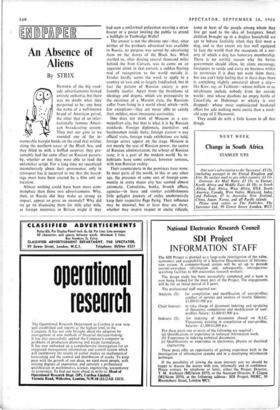An Absence of Miens
BP8P
By STRIX
Almost nothing could have been more com- monplace than those two advertisements. Why, then, in Russia did they make so strong an impact, appear so gross an anomaly? Why did we go on discussing them for mile after mile, as foreign motorists in Britain might if they had seen a uniformed policeman wearing a straw boater or a poster inviting the public to attend a bullfight in Tunbridge Wells?
The answer is not the obvious one—that, since neither of the products advertised was available in Russia, no purpose was served by advertising them on the shores of the Black Sea. What startled us, after driving several thousand miles behind the Iron Curtain, was to come on an apparent chink in that curtain, a sudden fleeting nod of recognition to the world outside it. Insular hardly seems the word to apply to a country so vast and so largely landlocked, but in fact the pattern of Russian society is pro- foundly insular. Apart from the thraldoms of ideology and dogma, which are prerequisite to the existence of a Marxist state, the Russians suffer from living in a world about which—with few exceptions—they are never able to satisfy their mildest, most innocuous curiosities.
One does not think of Moscow as a cos- mopolitan city, but that is what it is by Russian standards. Foreign diplomats, journalists and businessmen reside there; foreign statesm -n pay official visits, foreign trade exhibitions are held, foreign actors appear on the stage. Moscow is not merely the seat of Russian power, the centre of Russian administration, the arbiter of Russian taste; it is a part of the modern world. Its in- habitants have some contact, however tenuous, with non-Russian reality.
Their counterparts in the provinces- have none. In most parts of the world, in this or any other age, the presende of some sort of foreign com- munity in every major city has seemed almost axiomatic. Consulates, banks, . branch offices, agencies—in these and similar establishments little polyglot pockets of exiles unobtrusively keep their respective flags flying. Their influence may be minimal, but at least they are there; whether they inspire respect or excite ridicule, some at least of the people among whom they live get used to the idea of foreigners. Small children brought up in a dogless household are apt to behave foolishly when they first meet a dog, and to that extent are less well equipped to face the world than the occupants of a nur- sery of which a dog has honorary membership. There is no earthly reason why the Soviet government should allow, let alone encourage, foreigners to reside and carry on business within its territories if it does not want them there; but one can't help feeling that in these days there is something slightly unnatural about a city— like Kiev, say, or Tashkent—whose million or so inhabitants include nobody from the outside world: into whose dustbins no empty bottle of Coca-Cola or Dubonnet or whisky is ever dropped: whose most sophisticated bookstall offers for sale nothing more exotic than a week- old copy of L'Humanite.
They could do with a little leaven in all that dough.


































 Previous page
Previous page